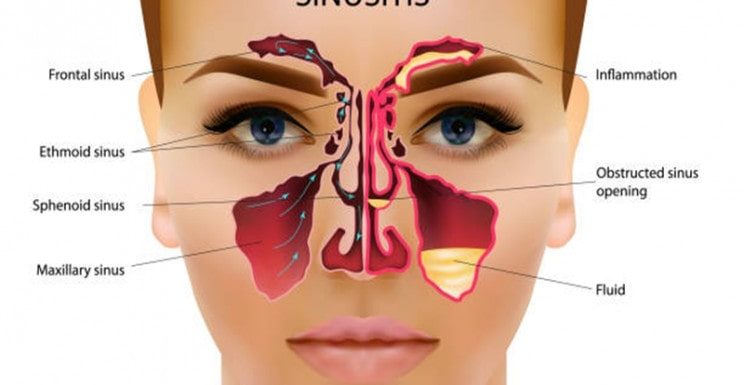
The sinuses are lined with mucous membranes that produce thin mucus to help moisten and cleanse the air you breathe. When you have a cold or other illness, this lining can become swollen or inflamed, and the condition is called Sinusitis. This can lead to pain and pressure around your eyes, nose, and cheeks.
In most cases, Sinusitis comes from an infection caused by viruses or bacteria that infect the frontal sinuses. Other causes include allergic reactions to pollen or irritants such as cigarette smoke.
Sinusitis can cause:
- A headache that worsens with bending over or looking up
- A constant ache in the face
- Pain when chewing food
- Pain when swallowing
- Facial pain that worsens with exercise or cold air
Young children are more prone to infections of the sinus, especially infants and toddlers. This is because they have small airways that make it easier for germs to enter their bodies from the air around them. Unfortunately, these small airways also make it harder for them to clear out infections on their own by coughing or sneezing. Therefore, parents need to watch for signs of infections in these areas so that they can be treated as quickly as possible!
Read on to know a few tips to manage Sinusitis in your little ones.
-
Give Hot Shower
A hot shower helps in reducing the pain and swelling caused by Sinusitis. Soaking feet in warm water can also help reduce the pain caused by Sinusitis.
-
Eucalyptus Oil Can Help
You may use eucalyptus oil as it helps in relieving congestion and inflammation in the nose and throat area. Add some drops of eucalyptus oil in a hot water bottle or place a towel soaked in hot water near your child’s bed so that he can inhale the vapors from it throughout the night.
-
Try Saline Nasal Spray
Saline nasal sprays help keep the nasal passages moist and prevent drying out, leading to crusting around the nose and mouth (a sign of Sinusitis). However, use this with caution in young children because it can cause choking if they inhale too much of it into their lungs.
-
Consider Nose Strips
The other effective way to relieve symptoms of Sinusitis in children is to use nose strips. They provide instant relief from nasal congestion and help your munchkin to have a good night’s sleep. But it is vital to consult before this product because it can also cause allergic reactions due to the presence of adhesive.
-
Take Care Of Nutrition
Children with a cold or flu may eat poorly during their illness. They may lose their appetite due to nasal congestion and facial pain, especially with swollen lymph nodes. They must eat healthy foods to get the vitamins and minerals needed to stay healthy even when they are sick. If possible, give them soft, bland foods such as rice or pasta with chicken or beef broth instead of chicken noodle soup, which will worsen their congestion. If your child refuses to eat anything, talk with your doctor about giving them supplements of certain vitamins and minerals until they feel better and have returned to normal eating habits.
Sinusitis also occurs due to a deficiency of several nutrients, especially vitamin D. Giving multivitamin drops regularly to children is an ideal choice to prevent this condition.
-
Keep Your Ward Hydrated
Drinking plenty of water is essential for maintaining proper health and immunity levels. It also helps keep mucus production under control. So make sure that your child drinks at least 8 glasses of water every day. Especially during winters when the air gets drier due to lack of humidity in the atmosphere and thus make breathing difficult.
-
Pay Attention To Their Sleep
Proper sleep is essential for kids to heal faster from Sinusitis. So, make sure your loved one takes proper rest and gets at least 11 hours of sleep a day.
Wrapping Up-:
Most of the children experience sinus at some point in their life. Indeed it is treatable, but if the proper medication is not given on time, Sinusitis can be a major health issue. By considering the above tips and giving multivitamin drops to your child, you can manage this health problem effectively.
